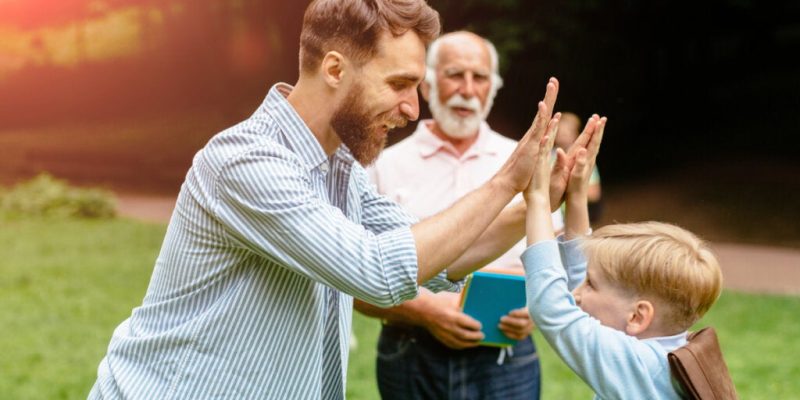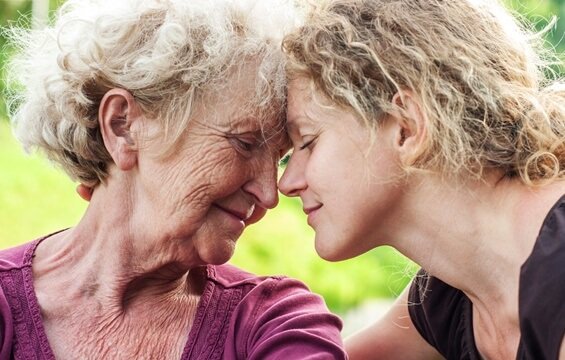When choosing people to associate with, we tend to prefer those of our own generations. The reasons are many. As a rule, we find it easier to share experiences with them. This is usually because the challenges we face and the ‘language’ we speak are similar. However, transcending our comfort zones and venturing to explore relationships with people from other generations can open doors to new experiences and knowledge. It can help us discover other ways of being that we wouldn’t otherwise have experienced.
There are certain spaces that favor contact between people of different generations. For example, school, work environments and, above all, the family. Nevertheless, mere coexistence isn’t enough. If we want to nurture and enrich each other, it’s important that we’re open and willing to meet and share.
Intergenerational relationships
Intergenerational relationships are the links established between people who belong to different generations. In the not-so-distant past, especially in rural settings, it was common to live in small communities and cohabit with members of the extended or in-law family. This facilitated the exchange of opinions and experiences, and time was shared between people of extremely different ages.
Today, Western societies are based on an individualistic model in which the nuclear family lives in relative isolation. The concept of ‘tribal raising’ no longer exists. Thus, it’s less common for children and adolescents to spend time with adults other than their own parents; and even less likely with elderly people, even if they belong to their own family. However, the diversity of these links is really beneficial and enriching, in fact, even essential.
The benefits of intergenerational relationships for the elderly
There’s a tendency to think that the elderly are incapable of understanding the young, that their traditional values are incompatible with current changes, and that they don’t want to change them.
Nevertheless, these people are generally much more open-minded than we imagine. Furthermore, they’re usually willing to ward off the feeling that they’re living in an increasingly strange world. In fact, they only require a little more time to do the same things as the rest of us.
For the elderly, intergenerational relationships can:
- Increase their energy, vitality, and motivation. Somehow, the enthusiasm of a child or young person is effortlessly contagious.
- Improve their emotional state by making them feel accompanied, cared for, and noticed by their environment. That’s because loneliness is one of the biggest problems in old age. Therefore, having the company, appreciation, and affection of others, especially young people, helps reduce this feeling. Indeed, intergenerational relationships form particularly positive support networks.
- Improve their self-esteem since they feel useful, important, and valuable in the other person’s life. Being able to share their experience, their knowledge, and their point of view helps them to feel integrated and productive. In effect, to have a purpose.
- Give them new challenges. Indeed, a link with someone younger encourages physical and mental activity and encourages active aging. From playing with a child to learning about social media from a teenager, these types of links offer multiple opportunities for older people to get out of their comfort zone and make an effort that usually proves to be beneficial.
- Help them integrate into society. In fact, contact with the younger generation is the best way for them to understand their values, ideals, and points of view, all of which are a reflection of today. Young people are also the best teachers in terms of technology and can facilitate the learning of older people in this aspect.
What about the young?
When we talk about fostering intergenerational relationships, we tend to think that it’s a sacrifice that young people make to help the elderly. However, the former can also greatly benefit from these links:
- If the older person is from the younger person’s family, they have the opportunity to discover their roots and history. They develop a sense of belonging and are better able to understand where they come from. They can also learn from their elders’ mistakes and know not to repeat them.
- The wisdom provided by years and experiences allows the elderly person to share their valuable knowledge on how to deal with situations, what decisions to make, and how to look at life from a broader perspective. This is something that young people lack.
- They can also transmit certain traditional values to the younger generation and help them remember their importance. For example, responsibility, the value of words, or the importance of mutual care beyond individualism.
- Children and adolescents can count on adult figures to turn to in times of need or when they’re searching for support or advice. After all, it’s not always possible or desirable for them to go to their parents. As such, having this type of network can make them feel safer and supported.
- Above all, it brings young people closer to the reality of the elderly and increases their empathy toward them. In fact, barriers are brought down and a less biased and more inclusive vision of the elderly is forged.

Fostering intergenerational relationships enriches us all
In view of these benefits, why not reap them? There are several volunteering organizations dedicated to facilitating these kinds of connections. That said, in many cases, it won’t even be necessary to resort to them. For example, it’s highly likely that in your neighborhood there’ll be people from the older generation who’d be willing to share what they know with others.
You just need to open your eyes and look around. You’ll soon find an opportunity to be part of an inter-generational exchange.
Often, an open and sincere conversation or a shared coffee is enough to enjoy these benefits. You could also get involved in joint activities that facilitate exchange. For example, cooking, gardening, playing board games, sharing a personal or professional endeavor, or a hobby. There are many alternatives. You just have to find the one that suits you and that you feel comfortable with to open your mind to another person’s reality.
The post Intergenerational Relationships Are Beneficial For Everyone appeared first on Exploring your mind.



















Comments